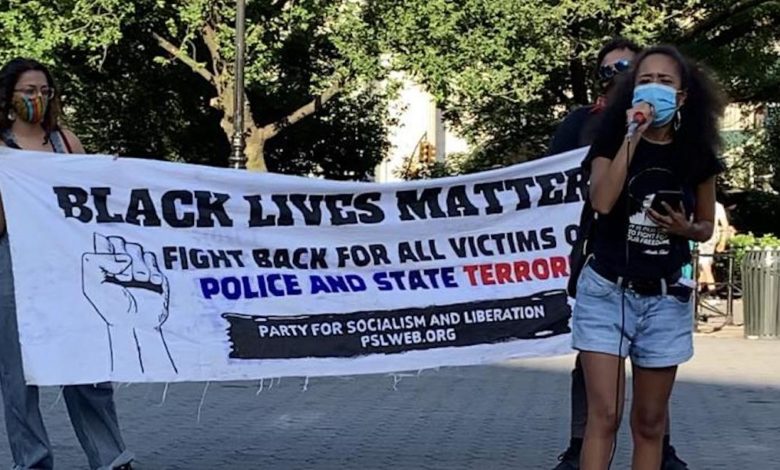
On July 13, the fifth anniversary of Sandra Bland’s death, about one hundred protesters gathered in New York City’s Union Square to mourn both Bland and the long list of Black women killed by police. Bland, a 28-year-old Black woman and Black Lives Matter activist, was pulled over in 2015 by a white state trooper in Texas for failing to signal a lane change. She was taken into custody at Waller County Jail, and three days after her arrest, was supposedly found hanging in her cell. Authorities ruled Bland’s death a suicide, but activists and Bland’s family disputes this ruling and the suspicious circumstances surrounding her death.
The current national uprising against racist police terror triggered by the murder of George Floyd has pushed names like Sandra Bland’s back into the public consciousness, and the recent deaths of Breonna Taylor and Nina Pop serve as tragic reminders that the lives of Black women are marked as disposable by the capitalist state.
Justice for Black trans women in particular has been a focus of recent protests, given the many intersecting oppressions they face resulting in 34 percent experiencing housing insecurity (making them particularly vulnerable to police harassment and violence), and a staggering 21 percent rate of incarceration
The Union Square rally, which was organized by People’s Power Assembly NYC and endorsed by the NYC branch of the Party for Socialism and Liberation, NYC Shut It Down, and the December 12th Movement, commenced with a few minutes of mourning, as organizers and attendees held up photos of Black women who had died at the hands of police and recited their names in their memory. Organizers stressed the imperative to protect Black women, to rally in support of and uplift Black women as long as the capitalist state continued to victimize and kill them with impunity.
Monica Cruz of the Party for Socialism and Liberation recalled how Bland’s death struck her especially hard, explaining, “I saw myself in Sandra very clearly. She was another young, Black woman, who was vocal in speaking up against police brutality….and she participated in the Black Lives Matter movement in her home city of Chicago, so I related to her a lot…and it was particularly hurtful to think that could have been me.”
But Cruz and other organizers also laid out the fundamental necessity to move beyond the language of reform, arguing that a system designed by the ruling class for enslavement and oppression must be transformed at a fundamental level. Speakers saw the only path to justice for Black women as militant, working class struggle, led by those made targets of and brutally victimized by the system.
“What we are fighting is a class war,” explained Cruz. “The nature of the state can only be transformed by revolution — a revolution to create a new set of laws and norms, a new state with a new class character, focused on poor and working class people, run by poor and working class people. That is what we demand, and we demand nothing short of it. There is no chance for police abolition under capitalism. There is no chance of Black liberation or liberation of any oppressed community under capitalism…Only through organization and protracted struggle can we have any chance of victory.”
“This sister [Bland] died needlessly,” said Brenda Stokely of the International Working Women’s Day Coalition. “But she died because this is the soil in which you breed this kind of killing and taking away of other people’s lives.”
Stokely encouraged the crowd to look at the foundations of this country and past waves of struggle to help show a path forward, saying “This is not a country that can be…patched up…It needs to be totally destroyed…You have to destroy it by being as well-organized every place you can…And the people that have to lead anything have to be the people that are most egregiously damaged…stomped on, and disrespected…There was a time when the Native Americans had their own organizations [like] AIM [American Indian Movement] that fought back just like the Black Panthers, that fought back just like the Young Lords…that’s where we have to get back to.”
The protesters marched across Manhattan through Chinatown, stopping at City Hall, site of a recent occupation demanding the defunding of the police. Here, organizers and attendees linked arms and recited the famous chant of revolutionary and former political prisoner Assata Shakur, a reminder of the justice needed for Sandra Bland, Breonna Taylor, Nina Pop, Atiana Jefferson, Monika Diamond, and all the Black women who have lost their lives to the capitalist police state:
“It is our duty to fight for our freedom. It is our duty to win. We must love each other and support each other. We have nothing to lose but our chains.”




